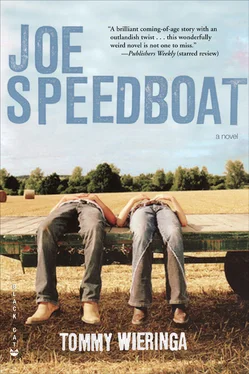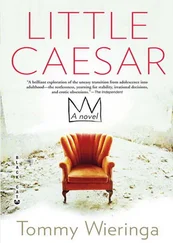I was practicing the Body of a Rock on the day of the cyclomowers. I thought I had found the liberating gravity of which he spoke. The tractor approached, I remained in place. I should have known better; Musashi himself says that unripe strategy produces sorrow.
Now, these many years later, I read it all again but it seemed to say something very different. The Book of Five Rings was like a gobstopper that changed colour all the time. Now I could apply it to defeat arm wrestlers. Wherever it said ‘sword’ I took the liberty of reading ‘arm’. That wasn’t actually so far-fetched, for what is a sword if not a sharp and artfully styled extension of the arm? With ‘sword’, Musashi himself probably meant other things as well, for he defeated his most daunting opponent, Sasaki Kojiro, with an oar. The whole point is the spirit of things, the word is merely a beast of burden with ever-changing meanings on its back.
Joe was taken with my fascination for the book. He walked around the house as he read about Holding Down a Shadow or, better yet, Scolding Tut-TUT, and he kept saying how fantastic it was. The Scolding of Tut-Tut was, in fact, very special:
‘To scold’ means that, when the enemy tries to counter-cut as you attack, you counter-cut again from below as if thrusting at him, trying to hold him down. With very quick timing you cut, scolding the enemy. Thrust up, ‘Tut!’, and cut, ‘TUT!’ This timing is encountered time and time again in the exchange of blows. The way to scold Tut-TUT is to time the cut simultaneously with raising your long sword as if to thrust at the enemy. You must learn this through repetitive practice.
‘Tut-TUT!’ Joe said. ‘Tut-TUT!’, and laughed himself silly.
The admonition to practice repetitively, he realized, meant that I needed opponents, for it made no sense to shout Tut-TUT at the dumbbells. I longed deeply for someone on whom I could unleash my growing strength and insight.
To make a long story short, Joe found Hennie.
Hennie Oosterloo was a dishwasher at the Little Red Rooster and had been in Lomark for as long as anyone could remember. He lived in one of those wooden houses you can buy for next to nothing at the garden store, at the back of the Little Red Rooster’s parking lot. Hennie and I had more things in common than the garden houses we lived in: he was, second only to me, the most uncommunicative person in the village. He must have been in his fifties, but he seemed innocent as a baby. And even though he was strong as a bull, people said he wouldn’t hurt a fly.
A few years earlier Hennie had been the talk of the town after he had let the waiting staff at the Little Red Rooster corral him into taking part in the July tractor-pull. These days there was a photo on the wall of the restaurant showing Hennie holding a gift certificate and an engraved silver plate and wearing a tight-fitting sleeveless vest with the logo CAFÉ REST. THE LITTLE RED ROOSTER LOMARK. In the picture he was holding the gift certificate and plate the way a savage might hold a vacuum cleaner.
I don’t know whether light ever penetrated into the brain of Hennie Oosterloo, whether he’d experienced pleasure at his victory or felt a gnawing dissatisfaction at wearing his life away in the washing-up room, but none of that was reflected in his face. He always wore the same, even-tempered expression, which was in fact no expression at all; his face, as it were, was always in neutral. He had a wispy beard and flabby lips, otherwise his face had no dents or bulges and his skin seemed stretched too tightly across his skull. Hennie was such a natural part of the landscape that I’d always looked past or through him, and now suddenly he walked into my life in a pair of blue jogging pants that looked like they were cut from terrycloth. His T-shirt read HARD ROCK CAFÉ CAPE TOWN, but I was sure he’d never been that far from home. He wormed his way through the door of my house.
‘Hennie, this is Frankie,’ Joe said. ‘Frankie, Hennie.’
Hennie turned his head left and right. I was located somewhere halfway through that sliding gaze, but he seemed to draw no distinction between a transistor radio, a pile of newspapers and my head. Joe stood between us a bit uneasily; by now he’d grown used to one silent type but two such enigmas must have been social agony, even for him.
‘Let’s get started, Hennie; if you’d just sit down here, opposite Frankie, that’s right, here.’
Joe placed us straight across from other and pulled two identical pieces of wood from a plastic bag.
‘These are handgrips,’ he said. ‘Is it OK if I screw them to the table? I want to show you what the real competition setup is like. These things are to keep you from using your weight unfairly.’
He put the grips, which were attached to two metal brackets with two holes each, upright on the table between Hennie and myself. From the plastic bag he then produced a cordless drill and ran four screws right through the tabletop. I slid up in my chair and, using my good hand, seized the spastic sparrow claw. I had to pry open the clenched fingers one by one and wrap them around the peg. Tight as a vice. The elbow of the other arm I placed in the middle of the table, and opened my hand.
‘Just one more thing, wait a minute.’
With a big piece of chalk Joe drew a square around our arms.
‘That’s the box,’ he said. ‘You have to stay inside it. If your arm moves over the line, you forfeit the match. OK, Hennie, if you’d just. . that’s right, yeah. And then put your other arm down, just like Frankie. . thanks.’
Hennie’s right forearm came down like a railroad barrier, somewhere in the middle of the box our hands locked. Both of us clutched the pegs with our other hand, producing a compact, symmetrical whole. It was a strange and intimate sensation to be holding the warm, dry hand of someone I barely knew.
‘Go,’ Joe said.
He pushed the chronograph button on his watch. Our hands clenched: I made sure mine was on top of Hennie’s right away, so he had to bend his wrist back; being on top gave you a big psychological advantage. The question, though, was whether psychology had any impact at all on Hennie Oosterloo’s tortoise brain. He kept his arm where it was, unmoving, in the middle of the table. That meant he had chosen the strategy of biding his time, letting me attack and awaiting his chance. I made sure I kept the pressure on, not to be caught out in an unguarded moment, and thought about Becoming the Enemy (‘In large-scale strategy, people are always under the impression that the enemy is strong, and so tend to become cautious’). But what was Hennie’s point in doing nothing? Did it mean something? I mustn’t think too much, I mustn’t place myself too much in the enemy’s shoes — attack him like a stone from a sling. The table creaked and I felt him give a little. Maybe my attack had encouraged him somehow; he rounded his shoulders and applied a kind of offensive counterpressure. It started slowly, but I felt it mounting like bad weather. I heard myself groan with a kind of comic-book sound and lost the Stance of Strategy (‘Your forehead and the space between your eyes should not be wrinkled. Do not roll your eyes nor allow them to blink, but slightly narrow them’). Slowly, as though melting, I lost ground.
‘Hey, Frankie!’
Oh, I didn’t want to disappoint him, not him, not in my first match. . I squeezed my eyes shut and, rising up out of the defeatism, I felt a blood-cloud of rage, the same as when I’d tried to strangle that roofer: a hot, red glow behind my closed eyes.
‘And. . three minutes are up!’
We both let go at the same time, my first round was over. Matches end after three minutes if neither opponent goes down. Arm wrestling is always about the best of three rounds. If your hand is even a fraction above your opponent’s, you’ve won. Hennie Oosterloo and I had ended our first struggle in a draw, that’s how I saw it. But even though Joe tried not to let it show, I sensed he’d been hoping for better.
Читать дальше












